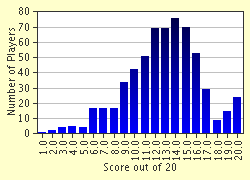Quiz Answer Key and Fun Facts
1. When does the book of Ruth take place?
2. Liberal scholars argue that Ruth was written after the Babylonian exile. Conservative scholars, however, place authorship during the reign of David. What evidence do they give?
3. If Ruth were regarded as a play, into how many acts would it be divided?
4. Naomi, Ruth's mother-in-law, was from Bethlehem. Why did her husband take her to Moab?
5. Which of Naomi's daughters-in-law decided not to accompany her back to Judah?
6. Ruth announced, "Whither thou goest, I will go; and where thou lodgest, I will lodge: thy people shall be my people, and thy God my God." This verse is used in some Christian liturgies during the marriage ceremony. To whom did Ruth make this vow?
7. Given the loyalty Ruth showed her mother-in-law, her name has a fitting meaning. From what Hebrew word is Ruth's name derived?
8. In the Book of Ruth, Boaz serves as Kinsman-Redeemer. What could the Kinsman-Redeemer "redeem"?
9. After the death of her sons and husband, Naomi gave herself a name that is a word meaning bitter. What was it?
10. Boaz did not notice Ruth until she was brought to his attention by one of his servants.
11. Why was Boaz kind to Ruth when she came to glean in his fields?
12. What did Boaz do for Ruth, soon after they first met?
13. Naomi did not think Ruth had much chance of snaring Boaz and advised her not to waste her time.
14. Ruth lay down beside Boaz to "uncover his feet" and asked him to "spread [his] skirt" over her. Conservative scholars argue that this means Ruth was proposing marriage. What do liberal scholars often argue it means?
15. When Ruth boldly requested that Boaz "spread his skirt" over her, he was offended by her forthrightness.
16. There was another man who had the first right, before Boaz, to redeem Ruth. Boaz tried very hard to persuade him to marry Ruth, but when he refused, Boaz agreed to assume the duty.
17. Boaz and Ruth had a son together. What was his name?
18. According to Jewish law as outlined in Deuteronomy, a son of a Moabite (such as Ruth) and of a Jew (such as Boaz) could be given immediate, full membership in the congregation of Israel.
19. The Book of Ruth was included in which portion of the Hebrew Bible?
20. Ruth is one of the five books read in the synagogue each year. During what feast is the book read?
Source: Author
skylarb
This quiz was reviewed by FunTrivia editor
gtho4 before going online.
Any errors found in FunTrivia content are routinely corrected through our feedback system.

